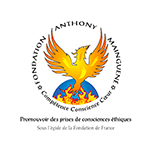COMPAST Project
Comparative study of contemporary ethical issues in occupational health
Health protection is a major issue in the workplace, as illustrated by the intensification of work, the “New Ways of Working” (NWOW), technological change, new ways of organising work, and the risks of pandemics. The consequences of these transformations materialise in the form of psychosocial risks (PSR)/harassment/discrimination, debates on quality of life at work (QWL) policies, chemical risks, nanoparticles, etc. and intersect with public health and health-environment issues. The protection of health at work is fundamental as each worker should be able to benefit from a fundamental right to go home in good health, respect for his or her person and physical and mental integrity.
Thus, the project aims to place the Nouvelle-Aquitaine Region at the forefront of research in the humanities and social sciences on the theme of ethical issues in occupational health, by providing regional research teams (in law, sociology, economics, management, psychology, ergonomics, philosophy, epidemiology, educational sciences, information and communication sciences, etc.) with a shared and collaborative framework for research. A mutualised and collaborative framework allowing the elaboration of multi and interdisciplinary works, the dialogue with professional actors, the study of innovative data, the comparison between national systems, and the scientific and socio-economic valorisation of this research at a national and international level.
In response to the contemporary issues in occupational health, the project is organised into four thematic workpackages (WP) corresponding to the crossroads of occupational health research in the Nouvelle-Aquitaine region and corresponding to the priorities of the Nouvelle-Aquitaine region. There are four of these workpackages, which are themselves divided into four workshops (WS). A preliminary “workshop 0 (WS0)” will be organised so that the team involved in this project can define and delimit its provisional conception – to be enriched over the course of the project – of ethics in occupational health, in order to begin work on the subject in a coherent manner through the prism of thematic approaches :
WS0 : Definition and delimitation of ethics in occupational health
WP1 : Education and occupational health (Coordinated by Laurence Bergugnat and Loïc Lerouge)
WS1 : Equal access to occupational health, health literacy
WS2 : Combating vulnerability in the workplace
WS3 : Cushion the career breaks, lifelong learning at work
WS4 : Ethical support for trainees, apprentices and disabled workers from the point of view of tutors.
WP2 : Organisation of work (Coordinated by Jacques Jaussaud and Loïc Lerouge)
WS1 : Ethics and decision-making (values, impact on others, meaning of work, pandemic), worklife balance, and organisation of life time
WS2 : How to integrate occupational health into economic logics
WS3 : End of career and ageing
WS4 : Innovation processes in organisations.
WP3 : Occupational health in the agricultural sector (Coordinated by Anne-Marie Soubielle and Loïc Lerouge)
WS1 : Wear and tear, chronic diseases, suicides
WS2 : Agro-ecological transition
WS3 : A risk-based or exposure-based approach to occupational health? Measuring health literacy
WS4 : Occupational health and the seasonal and precarious workforce.
WP4 : Digital technology and new ways of working (Coordinated by Vincent Bonnin and Loïc Lerouge)
WS1 : Telework, connection/disconnection, workload
WS2 : Artificial intelligence
WS3 : Collection and use of personal, biological and biometric data in the workplace
WS4 : The factory of the future and working conditions.

















Principal Investigator:
Loïc Lerouge
Project management and coordination



